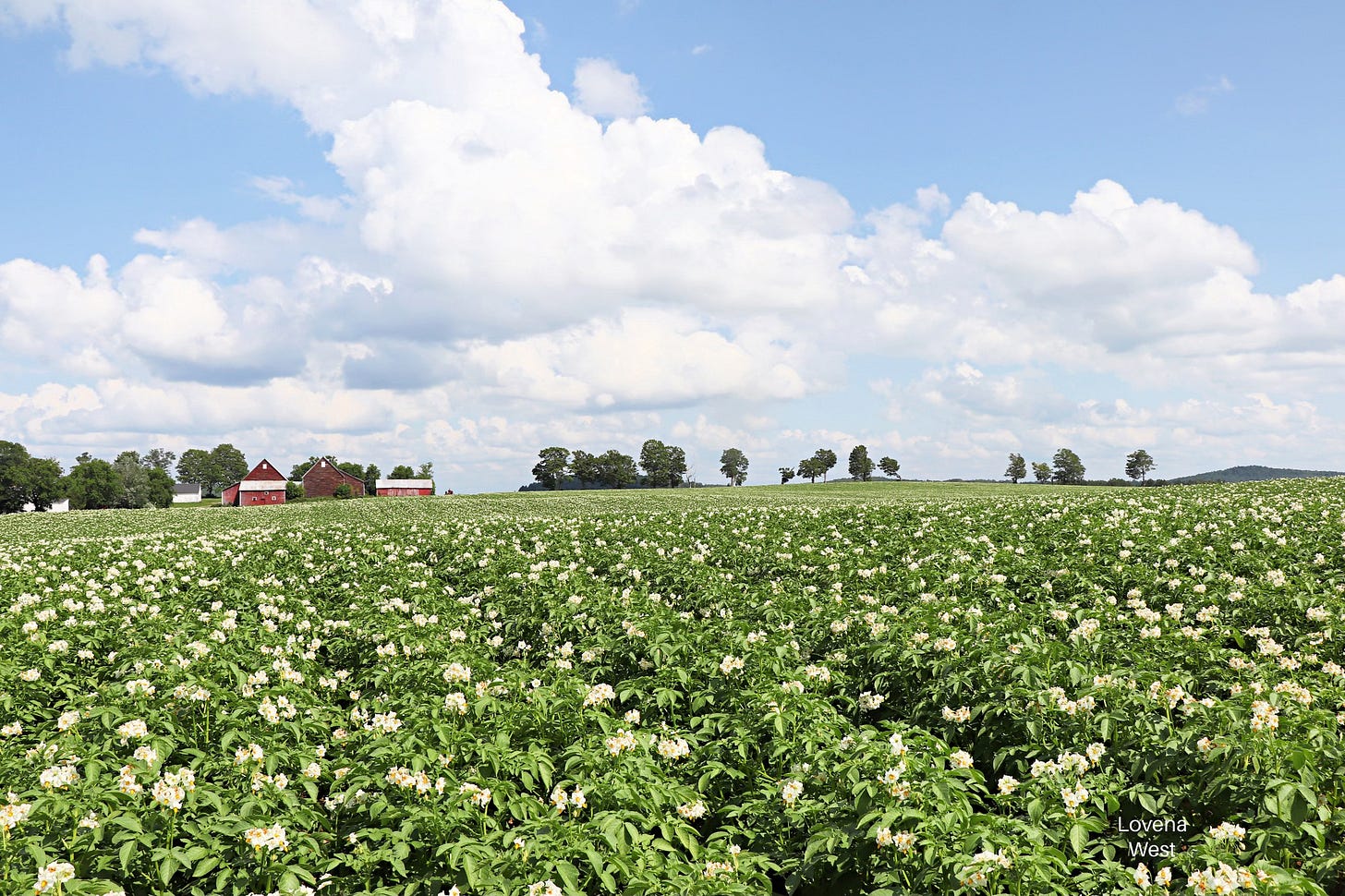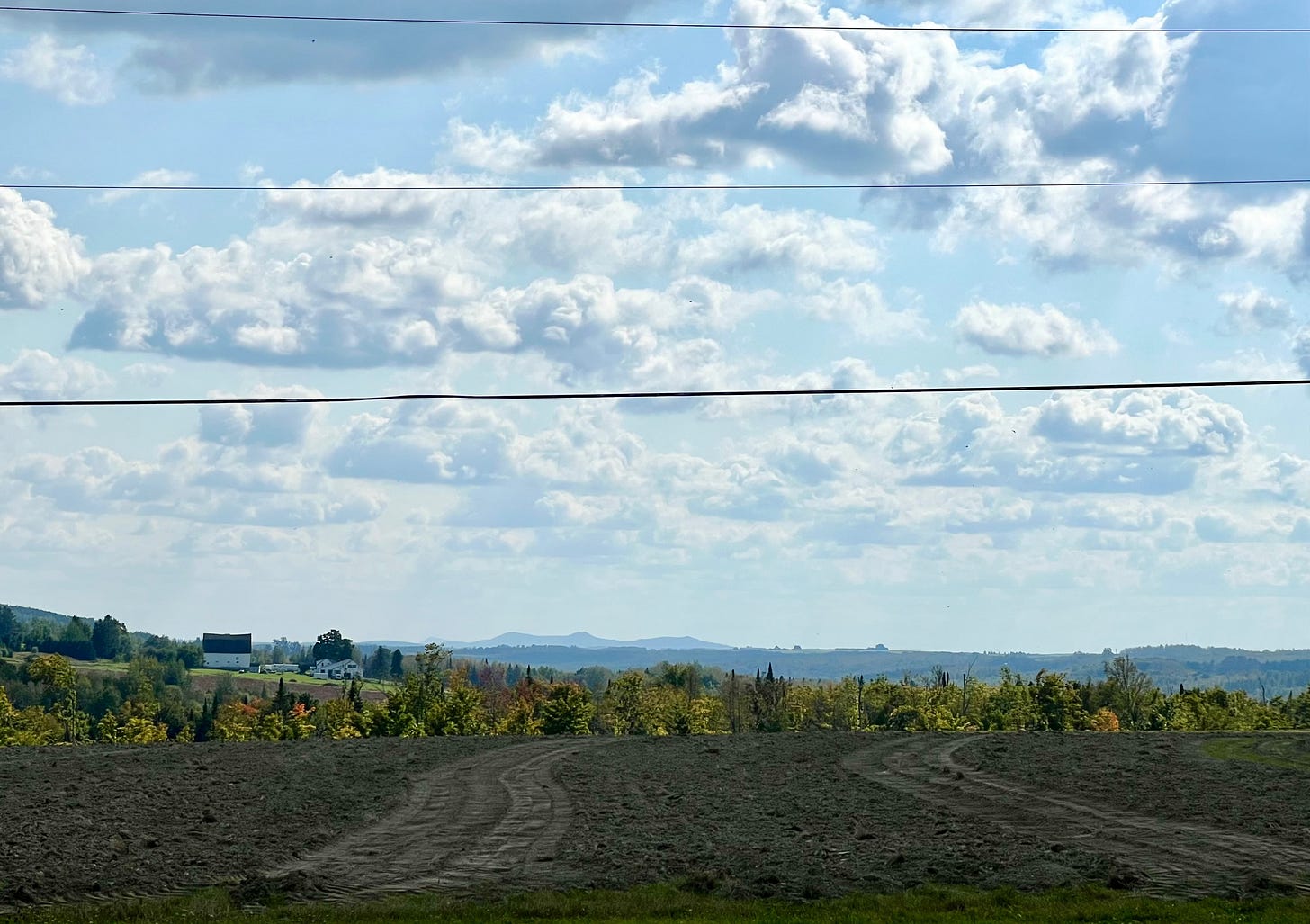I had never thought of autumn as the season of renewal until my bedroom window looked down on a working potato farm. This summer, all around our 1903 farmhouse, acres and acres of potato plants stretched to the horizon.
In spring, as soon as the ground thawed, tractors the size of houses passed by at sunrise every morning. They plowed, planted, sprayed, and watered without rest. I’m willing to bet the population of our town almost doubled with the farm workers that drove up for the season.
In summer, the plants bloomed – starting as pink, turning to white flowers like confetti among the big, green leaves. Potato blossoms smell sweet, and as the air warmed up in early August, the world smelled like jasmine.

Northern Maine celebrates everything, not least of all the potato blossoms. Potato Blossom Festivals pop up in practically every small town in Aroostook County. They have potato blossom pageants and parades, cotton candy and live music.
The festivals celebrate abundance and warmth, production and livelihood.
But last week after a spider-like, row-straddling piece of equipment swept the fields, the plants browned.
This week, the harvest began.
It’s a well-timed (and I imagine extremely stressful) choreography of harvest to truck to cold storage.
Right after harvest, after the dirt has settled, it will be tilled, plowed, amended, and seeded with a cover crop.
The day after harvest is the day of preparation, the time to renew the soil.
The words “fallow” and “dormancy” have continually emerged for me over the last few weeks. In the past, these words have had negative connotations in my mind. They meant a lack of fruit or production, a stage that was an almost-death.
As I’ve learned more about the natural world and its cycles, I’ve realized that what appears as near-death in dormancy or fallowness is actually a stage of incredible, unseen growth. The roots extend, create foundations, absorb nutrients and minerals, and prepare for an explosion of outward, visible fruitfulness.
The start of the Orthodox ecclesiastical year begins shortly after the Dormition of the Theotokos, the “falling asleep” of Mary. When I learned this a few years ago, I was completely puzzled by people wishing other Orthodox folks a “happy new year.” We were literally celebrating – that day – the repose of the Mother of God. So… happy new year?
Death, or more specifically, the repose of a saintly person, is not a wholly somber event. Sure, we mourn and grieve the loss of their physical presence. But still, why link the new year with the dormition of the Theotokos? Why would those two events in our calendar be side by side?
One morning last week, I told the ferns I would see them next spring, God willing. I told the leaves as they yellowed that they were beautiful in their repose. And that I would see them again next year, God willing. As we cut down the raspberry canes, I thanked them for their fruit and for allowing me to gift others with raspberry preserves. I told them I’d see them again next summer.
There’s a slight mourning in the death of the green and the abundant. But the golds and reds and oranges are too glorious to grieve too long. The trees will be bare soon enough, dormant. The fields will be covered in snow, fallow. But all along, roots will be extending and strengthening. The cover crops will amend the soil and add what was lost.
When planting a new sapling, you plant it in the fall so that it has all winter to establish its root system. When you plant bulbs, you plant them in the fall so that, by spring, they’ll be ready to blossom. We are not different. We need seasons of silent, imperceptible growth.
The seasons here in Northern Maine have given me such an insight into the wisdom of the Ecclesiastical Cycle. We are in the season of preparation and renewal in the autumn, readying ourselves at the start of the new year for Nativity, Lent, Pascha. We’ll be establishing roots to create new life, entering into the silence and expectation of winter and its waiting, watching, absorbing, healing.
There is such wonder in fallowness.
Happy New Year.







This beautiful writing reminds me of the precedent set in Creation. God said that a day is an evening and then a morning; the day is meant to begin with sleep. We rest in him first, and then wake to his new mercies each morning.
This is beautiful! I’m so thankful you have found such a peaceful home in which you experience spiritual freedom and growth. I’m proud of you! Love you and yours so very much.